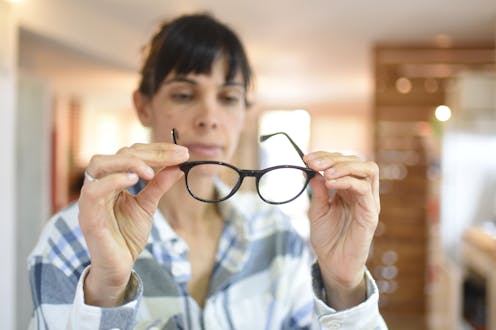
You may have seen advertisements claiming to eliminate the need for eyeglasses through vision therapy or vision training – basically, eye exercises.
These exercises include putting pressure on or palming the eye; eye movement exercises; or straining to read by using the wrong prescription glasses to “train” the eyes.
As a professor of ophthalmology – and as an eye doctor who has seen thousands of patients – I can tell you that no study to date shows strong evidence that these exercises eliminate the need for glasses or offer any long-term significant benefits. The science simply isn’t there.
Table of Contents
What the science says
The lack of evidence holds true for virtually all eye conditions and diseases, including common afflictions such as myopia, or nearsightedness, which refers to when closer objects are clear, but distant objects are blurry. It’s also true for farsightedness – also called hyperopia – which happens when objects are clear in the distance but blurry up close. Nor do these eye exercises help with presbyopia, or the need for reading glasses, which generally begins at around age 40.
With presbyopia, the patient is neither nearsighted nor farsighted and requires no glasses for distance vision. Yet as the lens of the eye becomes stiffer over time, the eye struggles to focus on fine print and smaller text. This decline will continue with age – and, with it, the need for stronger reading glasses will increase.
Although some methods claim to alleviate the need for reading glasses, there is limited if any evidence to suggest benefit.
That said, here are some things everyone can do to maintain healthy eyes:
Vision development in children
All children should have a baseline eye exam during infancy and then again between 6 and 12 months of age. They should have a third exam between ages 1 to 3, and then a more formal exam between ages 3 to 5 to check for eye misalignment, ocular health and the potential need for glasses.
Failing to address eye misalignment, or to provide glasses for a child who needs them, may lead to abnormal visual development or amblyopia, which is a weak, lazy eye.
Progression of nearsightedness in children can be slowed by taking breaks and avoiding hour after hour on the phone or computer. Limiting up-close reading time outside of school – screen time or otherwise – may help slow the progression of nearsightedness in children.
Prolonged screen time can cause eye strain and dryness. I suggest following the 20-20-20 rule: Take 20-second breaks every 20 minutes to look 20 feet away from your device. Focus on relaxing the eyes and blinking. The occasional use of artificial tears, which can be bought over the counter at drugstores, may help with dry eye.
Spending more time outdoors is good for your eyes. It has been correlated with a reduced incidence of nearsightedness in childhood. One caution: Staring directly into the Sun, even briefly, is dangerous and can cause permanent retinal damage.

Bill Oxford/E+ via Getty Images
Blue light blockers and supplements
Ads for blue-light-blocking glasses claim they prevent headaches and eye strain and improve sleep. But some studies, including a large, randomized control trial, found that blue-blocking lenses did not alter symptoms of eye strain. Additionally, there is only limited evidence to show that these glasses improve circadian rhythm.
Be wary of supplements or natural remedies that claim to be a cure-all for any eye condition. These assertions are not backed by rigorous scientific evidence, and there is no proof they improve vision, reduce eye floaters or eliminate the need for glasses. The same is true for claims that essential oils or other topical substances may improve vision.
While omega-3s have been previously touted for dry eye symptoms, there is no strong evidence that they help, although this does not discount their many other health benefits.
One study did demonstrate that progression of intermediate age-related macular degeneration slowed in some patients after using over-the-counter vitamins; specifically, the AREDS2 formula. However, these vitamins were not beneficial in patients with early or no signs of the disease.
What does work
There are some ocular conditions where vision therapy may be recommended, including issues such as misalignment of the eyes and trouble converging on objects up close, which can result in symptoms such as diplopia, or “double vision.” Ultimately, these conditions are best addressed by your eye doctor and are unrelated to the need for reading or distance glasses.
For overall eye health, a diet rich in vegetables and other healthy foods may help reduce the incidence of some eye diseases. Some studies also show that exercise is associated with a reduction in risk for developing glaucoma or age-related macular degeneration.
Cigarette smoking is associated with several eye diseases, including age-related macular degeneration, so quitting or avoiding smoking is critical.
Finally, don’t rub your eyes; it can lead to increased irritation. Removing makeup at nighttime helps minimize eyelid irritation. And don’t sleep with contact lenses in – it can lead to corneal infections and other conditions that could damage your eyesight.
![]()
Benjamin Botsford does not work for, consult, own shares in or receive funding from any company or organization that would benefit from this article, and has disclosed no relevant affiliations beyond their academic appointment.
























